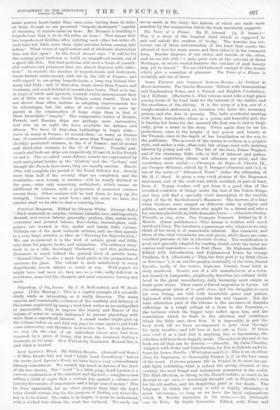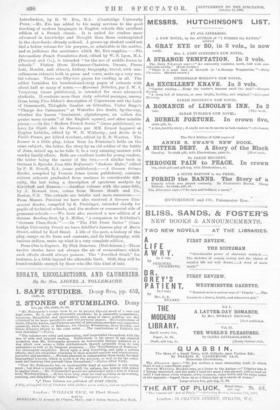SOME FRENCH AND GERMAN SCHOOL-BOOES.—Le ProtttgA de Marie Antoinette. Par
Xavier Marmier. Edited, with Grammatical
and Explanatory Notes, and a French and English Vocabulary, by J. Belfond. (Hachette.)—This volume must take a high place among books of its kind, both for the interest of the matter and the excellence of the editing. It is the story of a boy, son of a simple-minded enthusiast, an inventor who lacks the necessary genius, and who dies in poverty. The lad's accidental meeting with Marie Antoinette, when, as a young and beautiful girl, she is leaving her home for the married life that was to end so tragi- cally, gives a name to the story. Twice again does he see his
protectress, once in the height of her power and beauty at the Trianon, once in the depth of her humiliation on the way to the guillotine. The account of the Queen is written in a graphic style, and makes a tale, often told, but always read with undying interest by young and old. The life of the hero, Franz Wagner, and of his charming little wife, is full of interest and pathos. The notes explaining idioms and allusions are good, and the vocabulary most useful.--Chronigue du ItOgne de Charles IX., par Prosper Mlrimule, edited by P. Desages (Percival and Co.), is one of the series of " Advanced Texts" under the editorship of Mr. H. C. Steel. It gives a very vivid picture of the Huguenot movement, and of the civil wars which resulted, in part at least, from it. Young readers will get from it a good idea of the troubled condition of things under the last of the Valois Kings, and they will find a specially vivid description of the terrible night of the St. Bartholomew's Massacre. The horrors of a time when brothers were ranged on different sides in religion and politics, and when none knew who might be a friend and who a foe, are described with no little dramatic force.—Charlotte Corday : Tra Odic en cing Arles. Par Francois Ponsard. Edited by R. J. Morrit. (Same publishers.)—This drama is written with much spirit and force. The heroine is a parsonage who, whatever we may think of her deed, is of remarkable interest. Her character, and those of the chief Girondists, are well given, while there are some excellent pictures of life in Charlotte Corday. The versification is good, and specially adapted for reading aloud, while the notes are copious and instructive,—Le Petit Close. By Alphonse Daudet, Edited, with Introduction and Explanatory Notes, by George Petillcau, B.A. (Hachette.)—This, the first part (" Le Petit Chose en Province "), is an autobiography, nominally of the hero, Daniel Eysette, really of the writer, Alphonse Daudet, from birth to early manhood. Daniel, son of a silk manufacturer at a town, not named, in Languedoc, graphically describes his solitary child- hood in the great manufactory, daily becoming more empty as trade grew worse. Then comes a forced migration to Lyons. All the subsequent trials of le petit chose, and his struggles to earn his own living, are told with inimitable grace and pathos, lightened with touches of exquisite fun and humour. Not the least attractive part of the volume is the narrative of Daniel's sufferings in a rough college at a town in the Cevennes,— the tortures which the bigger boys inflict upon him, and the consolation which he finds in the affection and confidence which the little ones show him. It is impossible to put the book down till we have accompanied is petit chose through his early troubles, and left him at last safe in Paris. If those who read it as a task find it anything like so fascinating, the selection will have been happily made. The notes at the end of the book are all that can be desired.—Pierrille. By Jules Claretie. Adapted, with Notes and Introduction, for Use in Schools and Col- leges, by James Boielle. (Whittaker and Co.)—This is an excellent story for beginners, so thoroughly French is it in the best sense of the word. It shows peasant life in France in its most favour- able light, exhibiting what is indeed the saving element of the country, the most frugal and industrious peasantry in the world. The filial affection, so strong in the French nature, so much to be desired in our own, is touchingly brought out in Pierrille'e love for his old mother, and his despairing grief at her death. The language in which the story is told is highly idiomatic,--a groat advantage, so long as we have the lucid explanations which M. Bolelle furnishes in his notes.—Un Philosophe sous les Toils. By Emile Souvestre, Edited, with Notes and
Introduction, by H. W. Eve, M.A. (Cambridge University Press.:—Mr. Eve has added to his many services to the good teaching of modern languages in English schools this excellent edition of a French classic. It is suited for readers more advanced in knowledge and thought than those contemplated
in the class-books already noticed. A grown-up student could not find a better volume for his purpose, so admirable is the matter, and so judicious the assistance which Mr. Eve supplies.--The Intermediate French Translation-Book, edited by W. S. Lyon, MA. (Percival and Co.), is intended " for the use of middle forms in schools." Fiction (from Erekmann-Chatrian, Dumas, Pierre Loti, Daudet, and others), history, biography, travel, with mis- cellaneous extracts both in prose and verso, make up a very use- ful volume. There are fifty-two pieces for reading in all. The editor furnishes his hundred-and-sixty pages of extracts with about half as many of notes.—Morceaux 1161ach6s, par J. W. S. Vecqueray (same publishers), is intended for more advanced students. It contains more than sixty selected passages, among .thorn being Pere Didon's description of Capernaum and the Lake of Genesareth, Thdophile Gautier on Gibraltar, Victor Hugo's " Charge des Cuirassiers " at Waterloo (we doubt, by-the-way, whether the horses " tombaient, gigantesques, an milieu des quatre murs vivants " of the English square), and other notable pieces.—In the " Modern French Series " (same publishers), we have La Cigaie chez les Fourmis, par MM. Ernest Legouvd et Eugene Labiche, edited by W. H. Witherby ; and &oils de la Vieille France, par Alfred Assolant, edited by E. B. Wauton. The former is a little play, taken from La Fontaine's fable on the same subject ; the latter, the story by an old soldier of the battle of Jena, mixed up, as he tells it, in a very amusing manner with sundry family affairs. Both are excellent books for young readers, the latter being the easier of the two.---A similar book in German is Episodes from Otto Hoffmann's "Andreas Hofer," edited by P. B. Powell, B.A. (same publishers).—A German Science Reader, compiled by Francis Jones (same publishers), contains sixteen extracts graduated from easiness to considerable diffi- culty, the last being a description of spectrum analysis by Kirchhoff and Bunsen.—Another volume with the same title, by J. Howard Gow, comes from Messrs. Heath and Co., Boston, U.S. The extracts are briefer and more numerous.— From Messrs. Percival we have also received A German Com- mercial Reader, compiled by R. Preisinger, intended chiefly for pupils of technical schools, and the modern or commercial side of grammar-schools.—We have also received a new edition of A German Reading-Boolc, by A. Moller, " a companion to Schlutter's German Class-Book.' "—In " The Pitt Press Series " (Cam- bridge University Press) we have Schiller's famous play of Maria Stuart, edited by Karl Breul. A life of the poet, a history of the play, essays on its form and contents, and its bibliography, with various indices, make up what is a very complete edition.
From Clue to Capture, By Dick Donovan. (Hutchinson.)—These twelve stories have not always the air of vraisemblance which such efforts should always possess. The "Jewelled Skull," for instance, is a little beyond the allowable limit. Still, they will be found readable enough by those who like this kind of tale.



















































 Previous page
Previous page